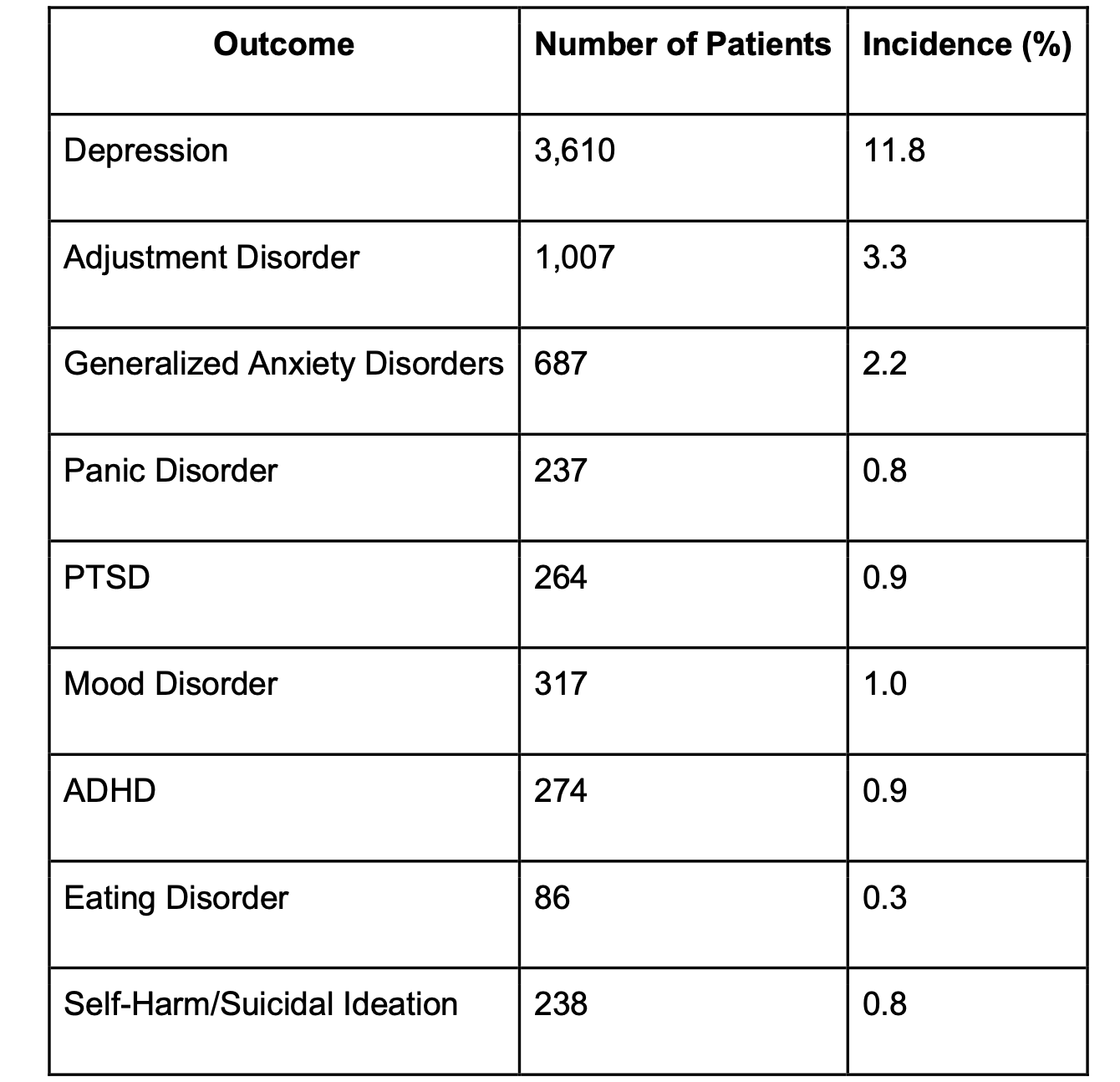Sunday Poster Session
Category: Liver
P1626 - Real-World Incidence of New Onset Mental Health Conditions in Patients Listed for Liver Transplantation
Sunday, October 26, 2025
3:30 PM - 7:00 PM PDT
Location: Exhibit Hall

Isha Samreen, MBBS, MPH (she/her/hers)
Hemet Global Medical Center
Anaheim, CA
Presenting Author(s)
Isha Samreen, MBBS, MPH1, Akash Patel, MD2
1Hemet Global Medical Center, Anaheim, CA; 2Rabin Medical Center, Riverside, CA
Introduction: Patients listed for liver transplantation often experience significant emotional and psychological stress due to the severity of liver disease and the uncertainty of receiving a transplant. While the physical burden of liver failure is well-studied, there is limited large-scale data on the incidence of mental health disorders following transplant listing. This study aimed to evaluate the real-world incidence of new-onset mental health conditions in liver transplant-listed patients using a large, multicenter federated health database.
Methods: We conducted a retrospective cohort analysis using the TriNetX US Collaborative Network, which includes data from 65 healthcare organizations. Adult patients (≥18 years) with a diagnosis indicating liver transplant status (ICD-10: Z94.4) but without a record of liver transplant procedure were included. To isolate new-onset conditions, we excluded all patients with documented diagnoses of depression, anxiety disorders, mood disorders, post-traumatic stress disorder (PTSD), adjustment disorders, eating disorders, ADHD, or self-harm behaviors prior to the listing date. The index event was the first documentation of liver transplant listing, and outcomes were assessed beginning one day afterward. The incidence of each mental health outcome was calculated using risk analysis and Kaplan–Meier survival methods.
Results: Among 30,711 eligible patients listed for liver transplant with no prior mental health diagnosis, the incidence of new-onset depression was 11.8%. Adjustment disorders occurred in 3.3%, anxiety disorders in 2.2%, mood disorders in 1.0%, PTSD in 0.9%, and panic disorders in 0.8%. Self-harm or suicidal ideation was observed in 0.8%, ADHD in 0.9%, and eating disorders in 0.3%. Kaplan–Meier survival analysis indicated that most mental health diagnoses occurred within two years of listing.
Discussion: Mental health disorders are common in patients listed for liver transplantation, with depression affecting nearly 1 in 8 individuals. These findings highlight the urgent need for structured psychological evaluation, early psychiatric support, and ongoing mental health surveillance for patients on the transplant waiting list.

Figure: Table 1: Incidence of New-Onset Mental Health Disorders Post-Listing
Disclosures:
Isha Samreen indicated no relevant financial relationships.
Akash Patel indicated no relevant financial relationships.
Isha Samreen, MBBS, MPH1, Akash Patel, MD2. P1626 - Real-World Incidence of New Onset Mental Health Conditions in Patients Listed for Liver Transplantation, ACG 2025 Annual Scientific Meeting Abstracts. Phoenix, AZ: American College of Gastroenterology.
1Hemet Global Medical Center, Anaheim, CA; 2Rabin Medical Center, Riverside, CA
Introduction: Patients listed for liver transplantation often experience significant emotional and psychological stress due to the severity of liver disease and the uncertainty of receiving a transplant. While the physical burden of liver failure is well-studied, there is limited large-scale data on the incidence of mental health disorders following transplant listing. This study aimed to evaluate the real-world incidence of new-onset mental health conditions in liver transplant-listed patients using a large, multicenter federated health database.
Methods: We conducted a retrospective cohort analysis using the TriNetX US Collaborative Network, which includes data from 65 healthcare organizations. Adult patients (≥18 years) with a diagnosis indicating liver transplant status (ICD-10: Z94.4) but without a record of liver transplant procedure were included. To isolate new-onset conditions, we excluded all patients with documented diagnoses of depression, anxiety disorders, mood disorders, post-traumatic stress disorder (PTSD), adjustment disorders, eating disorders, ADHD, or self-harm behaviors prior to the listing date. The index event was the first documentation of liver transplant listing, and outcomes were assessed beginning one day afterward. The incidence of each mental health outcome was calculated using risk analysis and Kaplan–Meier survival methods.
Results: Among 30,711 eligible patients listed for liver transplant with no prior mental health diagnosis, the incidence of new-onset depression was 11.8%. Adjustment disorders occurred in 3.3%, anxiety disorders in 2.2%, mood disorders in 1.0%, PTSD in 0.9%, and panic disorders in 0.8%. Self-harm or suicidal ideation was observed in 0.8%, ADHD in 0.9%, and eating disorders in 0.3%. Kaplan–Meier survival analysis indicated that most mental health diagnoses occurred within two years of listing.
Discussion: Mental health disorders are common in patients listed for liver transplantation, with depression affecting nearly 1 in 8 individuals. These findings highlight the urgent need for structured psychological evaluation, early psychiatric support, and ongoing mental health surveillance for patients on the transplant waiting list.

Figure: Table 1: Incidence of New-Onset Mental Health Disorders Post-Listing
Disclosures:
Isha Samreen indicated no relevant financial relationships.
Akash Patel indicated no relevant financial relationships.
Isha Samreen, MBBS, MPH1, Akash Patel, MD2. P1626 - Real-World Incidence of New Onset Mental Health Conditions in Patients Listed for Liver Transplantation, ACG 2025 Annual Scientific Meeting Abstracts. Phoenix, AZ: American College of Gastroenterology.

